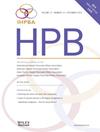The spectrum and outcome of metastatic hepatocellular carcinoma in a South African patient cohort
IF 2.7
3区 医学
Q2 GASTROENTEROLOGY & HEPATOLOGY
引用次数: 0
Abstract
Background
Hepatocellular carcinoma (HCC) is a leading cause of cancer-related death globally, particularly in developing countries in Southeast Asia and sub-Saharan Africa (SSA), where chronic hepatitis B virus (HBV) dominates as a major aetiological factor.
Methods
We conducted a retrospective cohort study to quantify the metastatic profile of HCC in a South African patient population managed at a tertiary centre. Demographic, clinical and treatment data were extracted from an institutional registry. Patients with and without metastases were compared to identify factors associated with an increased risk of developing metastases.
Results
Of 676 patients, 194 (28.7 %) had metastases. Patients with metastases were younger (46.37 vs. 52.23 years; p < 0.00001) and more frequently had chronic HBV, HIV co-infection and schistosomiasis compared to non-metastatic patients. The most common metastatic sites were lungs, skeletal, and peritoneum. For non-treated patients, skeletal metastases had the poorest survival.
Conclusion
This study confirms a typical SSA disease profile of aggressive HCC in a young population. We reported on the metastatic profile of HCC and the impact of different metastases on survival. Future research should focus on defining the concept of oligometastatic disease in HCC to identify patients where intervention targeting metastatic disease may be of benefit.
南非患者队列中转移性肝细胞癌的频谱和预后。
背景:肝细胞癌(HCC)是全球癌症相关死亡的主要原因,特别是在东南亚和撒哈拉以南非洲(SSA)的发展中国家,慢性乙型肝炎病毒(HBV)作为主要病因占主导地位。方法:我们进行了一项回顾性队列研究,以量化在三级中心管理的南非患者人群中HCC的转移情况。人口统计、临床和治疗数据从机构登记中提取。对有和没有转移的患者进行比较,以确定与发生转移风险增加相关的因素。结果:676例患者中,194例(28.7%)发生转移。转移患者年龄较轻(46.37 vs 52.23岁;结论:本研究证实了年轻人群中侵袭性HCC的典型SSA疾病特征。我们报道了HCC的转移特征以及不同转移对生存的影响。未来的研究应侧重于定义HCC低转移性疾病的概念,以确定针对转移性疾病的干预可能有益的患者。
本文章由计算机程序翻译,如有差异,请以英文原文为准。
求助全文
约1分钟内获得全文
求助全文
来源期刊

Hpb
GASTROENTEROLOGY & HEPATOLOGY-SURGERY
CiteScore
5.60
自引率
3.40%
发文量
244
审稿时长
57 days
期刊介绍:
HPB is an international forum for clinical, scientific and educational communication.
Twelve issues a year bring the reader leading articles, expert reviews, original articles, images, editorials, and reader correspondence encompassing all aspects of benign and malignant hepatobiliary disease and its management. HPB features relevant aspects of clinical and translational research and practice.
Specific areas of interest include HPB diseases encountered globally by clinical practitioners in this specialist field of gastrointestinal surgery. The journal addresses the challenges faced in the management of cancer involving the liver, biliary system and pancreas. While surgical oncology represents a large part of HPB practice, submission of manuscripts relating to liver and pancreas transplantation, the treatment of benign conditions such as acute and chronic pancreatitis, and those relating to hepatobiliary infection and inflammation are also welcomed. There will be a focus on developing a multidisciplinary approach to diagnosis and treatment with endoscopic and laparoscopic approaches, radiological interventions and surgical techniques being strongly represented. HPB welcomes submission of manuscripts in all these areas and in scientific focused research that has clear clinical relevance to HPB surgical practice.
HPB aims to help its readers - surgeons, physicians, radiologists and basic scientists - to develop their knowledge and practice. HPB will be of interest to specialists involved in the management of hepatobiliary and pancreatic disease however will also inform those working in related fields.
Abstracted and Indexed in:
MEDLINE®
EMBASE
PubMed
Science Citation Index Expanded
Academic Search (EBSCO)
HPB is owned by the International Hepato-Pancreato-Biliary Association (IHPBA) and is also the official Journal of the American Hepato-Pancreato-Biliary Association (AHPBA), the Asian-Pacific Hepato Pancreatic Biliary Association (A-PHPBA) and the European-African Hepato-Pancreatic Biliary Association (E-AHPBA).
 求助内容:
求助内容: 应助结果提醒方式:
应助结果提醒方式:


